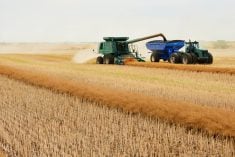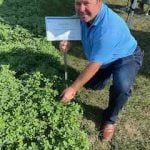The Canadian Seed Trade Association is seeking companies to become the exclusive suppliers of pedigreed seed for four forage varieties grown in Western Canada.
The CSTA is seeking bids from companies interested in managing seed production for Yukon sweet clover, Champ timothy, Beaver alfalfa and Rambler alfalfa.
The four varieties, all developed by Agriculture Canada, were previously managed by Pickseed.
Terry Ewacha, Pickseed’s executive vice-president of wholesale and western operations, said demand for seed from the varieties is limited.
The varieties were developed decades ago and are no longer widely produced, he said.
Read Also

Improving calf health, fighting pesticide resistance highlighted at Canada’s Outdoor Farm Show
New strides in agricultural innovation including improving calf health, fighting pesticide resistance were the featured topic at the University of Guelph Feeding The Future discussion at Canada’s Outdoor Farm Show 2025.
Over the past few decades, they have eventually been displaced by newer forage varieties that offer higher yields, better nutritional attributes and other agronomic improvements, he added.
If the CSTA is unable to find a managing company for any of the varieties, it will recommend to the Canadian Food Inspection Agency that the varieties be de-registered.
Companies interested managing seed production for the varieties must complete a Canadian Forage Seed Project (CFSP) variety application form and return it to the CSTA by May 1.
Companies awarded a tender will be required to sign a CFSP management contract with the CSTA.
That contract will allow the company to buy breeder seed from Agriculture Canada and multiply the seed for sale in commercial markets.
Ewacha said the financial risks involved in managing older forage varieties are increasing.
Along with limited demand for the seed, companies must retain seed inventories and renew seed stocks every few years.
With high commodity prices, it is becoming more difficult and more costly to find seed growers who are willing to produce small amounts of foundation forage seed.
Seed that sits in inventories too long eventually loses germination and must be replanted to maintain germination at an acceptable level.
Details of the CFSP are available online at cdnseed.org/library/canadian-forage-seed-project/.















